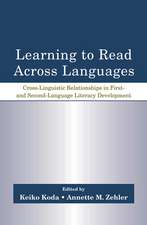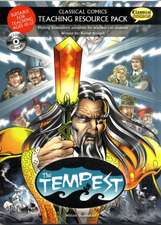Handbook of International Research in Mathematics Education
Editat de Lyn D. English, David Kirshneren Limba Engleză Paperback – 14 aug 2015
New perspectives are presented on a range of critical topics including embodied learning, the theory-practice divide, new developments in the early years, educating future mathematics education professors, problem solving in a 21st century curriculum, culture and mathematics learning, complex systems, critical analysis of design-based research, multimodal technologies, and e-textbooks. Comprised of 12 revised and 17 new chapters, this edition extends the Handbook’s original themes for international research in mathematics education and remains in the process a definitive resource for the field.
| Toate formatele și edițiile | Preț | Express |
|---|---|---|
| Paperback (1) | 866.09 lei 6-8 săpt. | |
| Taylor & Francis – 14 aug 2015 | 866.09 lei 6-8 săpt. | |
| Hardback (1) | 2233.80 lei 6-8 săpt. | |
| Taylor & Francis – 11 sep 2015 | 2233.80 lei 6-8 săpt. |
Preț: 866.09 lei
Preț vechi: 1056.21 lei
-18% Nou
Puncte Express: 1299
Preț estimativ în valută:
165.75€ • 172.40$ • 136.83£
165.75€ • 172.40$ • 136.83£
Carte tipărită la comandă
Livrare economică 14-28 aprilie
Preluare comenzi: 021 569.72.76
Specificații
ISBN-13: 9780415832045
ISBN-10: 0415832047
Pagini: 738
Ilustrații: 28 black & white tables
Dimensiuni: 178 x 254 x 43 mm
Greutate: 1.29 kg
Ediția:Revised
Editura: Taylor & Francis
Colecția Routledge
Locul publicării:Oxford, United Kingdom
ISBN-10: 0415832047
Pagini: 738
Ilustrații: 28 black & white tables
Dimensiuni: 178 x 254 x 43 mm
Greutate: 1.29 kg
Ediția:Revised
Editura: Taylor & Francis
Colecția Routledge
Locul publicării:Oxford, United Kingdom
Public țintă
PostgraduateCuprins
Section 1. Priorities in International Mathematics Education Research. Chapter 01. Changing Agendas in International Research in Mathematics Education. Lyn D. English and David Kirshner. Chapter 02. Perspectives on Priority Mathematics Education: Unpacking and Understanding a Complex Relationship Linking Teacher Knowledge, Teaching, and Learning. Charalambos Y. Charalambous and Demetra Pitta-Pantazi. Chapter 03. Approaches to Embodied Learning in Mathematics. Susan Gerofsky. Chapter 04. Configuring Learning Theory in Support of Teaching. David Kirshner. Section 2. Democratic Access to Mathematics Learning. Chapter 05. Young Children’s Access to Powerful Mathematics Ideas: A Review of Current Challenges and New Developments in the Early Years. Joan Moss, Catherine D. Bruce, and Janette Bobis. Chapter 06. Powerful Ideas in Elementary School Mathematics. David W. Carraher and Analúcia D. Schliemann. Chapter 07. Students’ Access to Mathematics Learning in the Middle and Junior Secondary Schools. Teresa Rojano. Chapter 08. Mathematical Structure, Proof and Definition in Advanced Mathematical Thinking. Joanna Mamona-Downs and Martin L. N. Downs. Chapter 09. Reform as an Issue for Mathematics Education Research: Thinking about Change, Communication, and Cooperation. Michael N. Fried and Miriam Amit. Chapter 10. Prospective Mathematics Teachers’ Learning and Knowledge for Teaching. Joao Pedro Da Ponte and Olive Chapman. Chapter 11. Educating Future Mathematics Education Professors. Jeremy Kilpatrick and Denise Spangler. Section 3. Transformations in Learning Contexts. Chapter 12. Problem Solving in a 21st Century Mathematics Curriculum. Lyn D. English and Julie Gainsburg. Chapter 13. Critical Issues in Culture and Mathematics Learning. Peter Appelbaum and Charoula Stathopoulou. Chapter 14. Mathematics Education and Democracy: An Open Landscape of Tensions, Uncertainties, and Challenges. Ole Skovsmose and Miriam Godoy Penteado.Chapter 15. Toward a Sociology of Mathematics Education: Examining Democratic Access in U.S. Schools. Celia Rousseau Anderson and William F. Tate. Chapter 16. Mathematics Learning In and Out of School: Towards Continuity or Discontinuity? Guida de Abreu and Sarah Crafter. Chapter 17. Perspectives on Complex Systems in Mathematics Learning. Brent Davis and Elaine Simmt. Section 4. Advances in Research Methodologies. Chapter 18. Researching Mathematical Meanings for Teaching. Patrick W. Thompson. Chapter 19. Measurement Challenges in Mathematics Education Research. Rosemary Callingham. Chapter 20. Design Research: An Analysis and Critique. Paul Cobb, Kara Jackson, and Charlotte Dunlap. Chapter 21. The Intertwining of Theory and Practice: Influences on Ways of Teaching and Teachers’ Education. Annalisa Cusi and Nicolina A. Malara. Chapter 22. Knowledge creation through dialogic interaction between the practices of teaching and researching. Kenneth Ruthven and Simon Goodchild. Section 5. Influences of Advanced Technologies. Chapter 23. Foundations For The Future: The Potential of Multimodal Technologies for Learning Mathematics. Stephen Hegedus and David O. Tall. Chapter 24. Statistical Software and Mathematics Education: Affordances for Learning. Jane Watson and Noleine Fitzallen. Chapter 25. The Use of Digital Technology in Mathematical Practices: Reconciling Traditional and Emerging Approaches. Luis Moreno-Armella and Manuel Santos-Trigo. Chapter 26. Computerized Environments in Mathematics Classrooms: A Research-Design View. Rina Hershkowitz, Michal Tabach, and Tommy Dreyfus. Chapter 27. E-textbooks in/for Teaching and Learning Mathematics: A Potentially Transformative Educational Technology. Birgit Pepin, Ghislaine Gueudet, Michal Yerushalmy, Luc Trouche, and Daniel I. Chazan. Chapter 28. Digital Technologies in the Early Primary School Classroom. Nathalie Sinclair and Anna Baccaglini-Frank. Final Comment. Chapter 29. Mathematics Education Research: a strategic view. Hugh Burkhardt.
Notă biografică
Lyn D. English is a professor of STEM in education within the Faculty of Education at Queensland University of Technology, Australia. She is a fellow of the Academy of the Social Sciences in Australia and the founding editor of the international journal Mathematical Thinking and Learning.
David Kirshner is a professor in the School of Education at Louisiana State University, USA, and co-director of the Gordon A. Cain Center for Scientific, Mathematical, Engineering, and Technological Literacy at that institution.
David Kirshner is a professor in the School of Education at Louisiana State University, USA, and co-director of the Gordon A. Cain Center for Scientific, Mathematical, Engineering, and Technological Literacy at that institution.
Recenzii
"This state of the art handbook reflects a truly international authorship, with comparable scope in topic coverage - with a focus on democratic access, learning contexts, research methods, and the changing technological world. If you want up-to-date scholarship in these areas, this is the source." --Alan Schoenfeld, University of California, Berkeley
"This handbook provides a comprehensive and topical map of research in mathematics education. It is not only an indispensable resource for those interested in a broad overview of the priorities of the research field, but also provides penetrating analyses of the major developments within those priority issues. The volume brilliantly reflects the dynamics of research topics in mathematics education; change, advance, and transformation constitute the organising principles of the book. Without doubt, the third edition of this handbook is essential reading and a cutting edge reference in the field." --Uwe Gellert, Professor of Mathematics Education, Freie Universität Berlin, Germany
"This handbook provides a comprehensive and topical map of research in mathematics education. It is not only an indispensable resource for those interested in a broad overview of the priorities of the research field, but also provides penetrating analyses of the major developments within those priority issues. The volume brilliantly reflects the dynamics of research topics in mathematics education; change, advance, and transformation constitute the organising principles of the book. Without doubt, the third edition of this handbook is essential reading and a cutting edge reference in the field." --Uwe Gellert, Professor of Mathematics Education, Freie Universität Berlin, Germany
Descriere
This third edition of the Handbook of International Research in Mathematics Education provides a comprehensive overview of the most recent theoretical and practical developments in the field of mathematics education.









